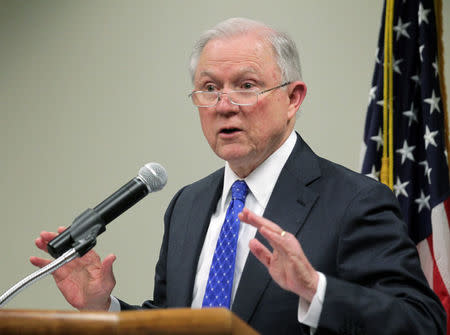U.S. attorney general renews calls to prosecute first-time border crossers

By Sarah N. Lynch and Mica Rosenberg
WASHINGTON/NEW YORK (Reuters) - U.S. Attorney General Jeff Sessions ramped up calls on Friday to criminally prosecute immigrants who cross illegally into the United States, adding to a barrage of statements on immigration by the administration of President Donald Trump this week.
Pointing to an upswing in border crossings to levels seen during former President Barack Obama's tenure, Sessions said he was ordering U.S. attorneys offices near the Southwest border to prioritize bringing cases against first-time offenders.
Once border crossers are charged with illegal entry and deported, they can be charged with a felony carrying significant jail time if they are caught crossing illegally again.
Trump signed a memorandum on Friday ordering the end of the policy known as "catch and release," in which illegal immigrants are released from detention while awaiting a court hearing on their status.
Ending "catch and release" was one of Trump's central promises during the 2016 campaign, but immigration authorities have faced a shortage of space to house people who have been detained.
Among the measures outlined in the memo, Trump directed the departments of Defense and Homeland Security to produce a list of military facilities that could be used to detain illegal immigrants.
Earlier this week Trump pledged to deploy the National Guard to assist with border operations because he has not been able to secure funding to fulfill a central campaign promise of building a wall along the U.S.-Mexico border.
Defense Secretary Jim Mattis signed a memo on Friday authorizing the deployment of up to 4,000 National Guard troops. The memo said the troops "will not perform law enforcement activities or interact with migrants."
About 150 National Guard members from Arizona will deploy to the border next week, Arizona Governor Doug Ducey said on Twitter. The Texas National Guard said it was preparing to send about 250 troops to the border within three days.
The United States has sent military to the border a number of times over the years.
Sessions directed the U.S. attorneys offices in southern California, Arizona, New Mexico and Texas to prosecute all the cases referred to under the criminal entry statute, known as 1325, "to the extent practicable."
Sessions in April 2017 had instructed prosecutors to increase their focus on criminally charging first-time offenders as well as people with multiple entries.
Some federal prosecutors, defense attorneys and judges have expressed concerns that charging border crossers en masse is a drain on court resources.
Supporters of Session's approach have said that criminal penalties deter repeat crossers, while detractors have said the prosecutions can deny legitimate asylum seekers the ability to properly file claims.
"This will be assembly-line justice, where large numbers of defendants are forced through the system without adequate time to consult counsel," Cecillia Wang, a deputy legal director at the American Civil Liberties Union, said in a statement.
In December 2017, a group of immigrant advocacy organizations filed a complaint with the U.S. Department of Homeland Security's Civil Rights and Civil Liberties division claiming that some immigrants being criminally prosecuted for crossing the border were being forcibly separated from their children.
A Justice Department spokesman declined to comment on the complaint.
(Reporting by Sarah N. Lynch in Washington and Mica Rosenberg in New York; Additional reporting by Reade Levinson in New York and Eric Beech in Washington; Editing by Leslie Adler)

